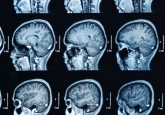Steady with the steroids! Brain damage linked to cognitive dysfunction and steroid treatment in lupus patients

Researchers have discovered that brain microstructure damage in lupus patients is marked by cognitive dysfunction and related to steroid treatment.
Cognitive dysfunction, such as memory problems, are common in systemic lupus erythematosus (SLE) patients, and the autoimmune disease is particularly severe in Asian patients. A team from the NUS Yong Loo Lin School of Medicine (Singapore) investigated the mechanism behind cognitive dysfunction in lupus patients, utilizing a novel MRI technique to study the patients’ brains. Brain damage and cognitive dysfunction in the patients were related to steroid medication, suggesting that clinicians should be cautious when prescribing steroids.
In the study, published in Rheumatology, the researchers utilized free water diffusion MRI and computerized neuropsychological assessment. They compared the free water signals in lupus patients without clinically overt neuropsychiatric manifestations, with that of their healthy counterparts. They discovered that SLE patients had significantly higher white matter free water, indicating possible microvascular degradation and/or inflammation in the brain. In addition, increased free water was found to be significantly related to cognitive dysfunction and cumulative steroid dosages.
The star of the show: scientists extract anticancer steroids from starfish
A multi-institutional team of Russian scientists has extracted four novel steroids from the starfish Ceramaster patagonicus, which they have shown to have anticancer properties.
“The clinical implications of the study would indicate to physicians that steroids should be judiciously prescribed, aiming for the lowest possible dose for the shortest possible duration. While systemic use of steroids will continue to be the mainstay of treatment for moderate to severe SLE-related inflammation, there are other therapeutic options that could produce similar results: these should be considered first in order to reduce steroid use or shorten the necessary course,” explained Anselm Mak, a lead author of the study.
The investigators suggest that non-steroidal drugs could be used to tackle SLE symptoms instead, such as topical treatment for hair loss and topical analgesics for oral ulcers. They also note that patients on long term steroid treatments should be regularly assessed for signs of cognitive dysfunction. One tool that could be used to achieve this is the Automated Neuropsychiatric Assessment Matrix (ANAM), which has been validated for use in adult and pediatric SLE patients.
It remains to be seen whether a reduction in steroid dosage could reduce the level of white matter free water and improve cognitive function. What’s more, the mechanism behind the free water-related cognitive dysfunction is yet to be uncovered. The team hope to investigate the mechanism using longitudinal multimodal imaging, behavioral assays and blood assays in SLE patients.





